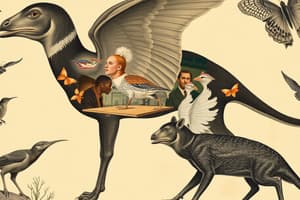Podcast
Questions and Answers
What relationship does zoology help to understand?
What relationship does zoology help to understand?
- Relationships between animals and their cognitive abilities
- Relationships between animals and their anatomical features
- Relationships between animals and their social structures
- Relationships between animals and their environment (correct)
What does evolutionary biology integrate into the study of animal diversity?
What does evolutionary biology integrate into the study of animal diversity?
- Behavioral psychology
- Genetic engineering techniques
- Ecological interactions
- Evolutionary principles (correct)
What tool is often used to display evolutionary relationships?
What tool is often used to display evolutionary relationships?
- Behavioral charts
- Phylogenetic trees (correct)
- Anatomical diagrams
- Gene maps
How has animal diversity developed according to zoology?
How has animal diversity developed according to zoology?
What aspect is essential for a complete understanding of animal life?
What aspect is essential for a complete understanding of animal life?
What is the primary focus of zoology?
What is the primary focus of zoology?
In animal classification, which category comes directly after Phylum?
In animal classification, which category comes directly after Phylum?
Which characteristic is NOT typical of animals?
Which characteristic is NOT typical of animals?
What does animal physiology study?
What does animal physiology study?
What type of behaviors does ethology primarily study?
What type of behaviors does ethology primarily study?
Which factor is NOT affecting animal populations according to conservation efforts?
Which factor is NOT affecting animal populations according to conservation efforts?
What ability differentiates most animals from plants?
What ability differentiates most animals from plants?
Studying animal behavior can involve which of the following settings?
Studying animal behavior can involve which of the following settings?
Flashcards
Evolutionary Biology
Evolutionary Biology
The study of how organisms change over time due to natural selection and other evolutionary forces.
Animal Diversity
Animal Diversity
The many different types of animals, from the smallest insects to the largest whales.
Evolutionary Adaptation
Evolutionary Adaptation
The process by which animals adapt to their environment, leading to changes in their features and behaviors over time.
Phylogenetic Trees
Phylogenetic Trees
Signup and view all the flashcards
Identifying New Species
Identifying New Species
Signup and view all the flashcards
What is Zoology?
What is Zoology?
Signup and view all the flashcards
How are animals classified?
How are animals classified?
Signup and view all the flashcards
What are the basic characteristics of animals?
What are the basic characteristics of animals?
Signup and view all the flashcards
What is animal physiology?
What is animal physiology?
Signup and view all the flashcards
What is animal behavior?
What is animal behavior?
Signup and view all the flashcards
How does ecology relate to animal conservation?
How does ecology relate to animal conservation?
Signup and view all the flashcards
What is a species?
What is a species?
Signup and view all the flashcards
What is animal evolution?
What is animal evolution?
Signup and view all the flashcards
Study Notes
General Overview of Zoology
- Zoology is the biological study of animals.
- This field encompasses many disciplines including behavior, physiology, genetics, and evolution.
- Zoologists examine animal variety, interactions with each other and their surroundings.
- Their work involves observation, documentation, and analysis of animal features and behaviors.
Animal Classification
- Animals are grouped by shared characteristics.
- A hierarchical system (Kingdom, Phylum, Class, Order, Family, Genus, Species) organizes these groups.
- This ordering reflects evolutionary relationships among species.
- Examples of animal phyla: Chordata (backbone), Arthropoda (insects, arachnids, crustaceans), Mollusca (snails, clams, octopuses).
Animal Characteristics
- Animals are multicellular organisms.
- They are heterotrophic, obtaining energy by consuming other organisms.
- Most animals can move (motile).
- Animals have specialized tissues and organs for functions like digestion, respiration, and reproduction.
- Life cycles range from an embryo to an adult form.
Animal Physiology
- Animal physiology studies how animal systems function.
- Systems include nervous, circulatory, respiratory, digestive, excretory, and reproductive systems.
- Research might focus on adaptations to specific environments or behaviors.
- Physiological processes are impacted by environment (temperature, oxygen) and genetics.
Animal Behavior
- Animal behavior (ethology) studies animal interactions with their environment and each other.
- Behaviors range from instinctive to learned.
- Research often takes place in natural habitats or controlled labs.
- Behaviors studied include foraging, communication, mating rituals, and social interactions.
Ecology and Conservation
- Understanding animal-environment interactions is crucial for conservation.
- Animal populations are affected by factors like habitat loss, pollution, and climate change.
- Conservation strategies aim to protect biodiversity.
- Zoology helps comprehend the complex relationships between animals, their environment, and ecosystem impact.
Evolutionary Biology
- Zoology integrates evolutionary principles to study animal diversity and adaptation.
- Evolutionary pressures shape organisms over time.
- Phylogenetic trees illustrate evolutionary relationships.
- Understanding evolutionary history provides a complete view of animal life.
Animal Diversity
- Animals show remarkable variety in form, function, and behavior.
- Adaptations to diverse environments cause this variation.
- Zoologists study the vast array of animals, from tiny invertebrates to large mammals.
- Discovering and documenting new species is an ongoing zoological process.
Studying That Suits You
Use AI to generate personalized quizzes and flashcards to suit your learning preferences.




